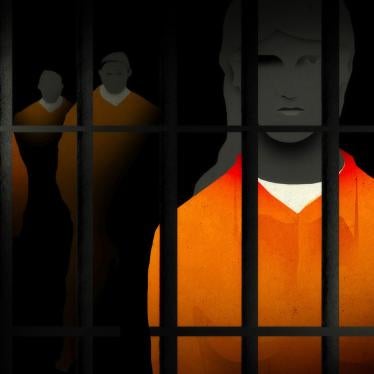(New York) - Human Rights Watch denounced recent attempts by Serb police to bar independent Finnish forensic investigators from exhuming the grave site at Gornje Obrinje as the unacceptable obstruction of efforts to curtail war crimes in Kosovo.
Human Rights Watch called upon the international community to take immediate and forceful steps to ensure that the Yugoslav government allows for unimpeded investigations into humanitarian law violations in Kosovo.
On several occasions, the Yugoslav authorities have also interfered with the work of investigators for the International Criminal Tribunal for the former Yugoslavia (ICTY). ICTY investigators have repeatedly been denied visas and have been barred by Yugoslav authorities from carrying out investigations in Kosovo.
"Once again, the outlaw government of Milosevic is showing that it will not cooperate with the world in bringing war criminals to justice," said Holly Cartner, Executive Director of the Europe and Central Asia Division of Human Rights Watch. "This is unacceptable. The international community must vigorously protest these serious incidents of non-compliance and insist on immediate and total cooperation with both the International Criminal Tribunal for the former Yugoslavia (ICTY) and the Finnish forensic investigators."
The 19-member Finnish forensic team has been meticulous in seeking the required permissions from Serb and Yugoslav authorities. The team, which is sponsored by the European Union, has obtained permission from Yugoslav authorities and the local courts to exhume six sites in Kosovo: Gornje Obrinje, Orahovac, Golubovac, Glodjane, Klecka, and Volujak. These sites contain the bodies of victims of alleged humanitarian law violations by both the Yugoslav forces and the insurgent Kosovo Liberation Army.
On Thursday, December 10, the forensic team attempted to travel to the Gornje Obrinje grave site, but were prevented from reaching the site by a convoy of about ten armored personnel carriers manned by heavily armed members of the Serb police. The Serb police insisted on accompanying the forensic team to Gornje Obrinje, which is located deep within territory currently under the control of the KLA.
Gornje Obrinje was the scene of one of the most serious killings of ethnic Albanian civilians by Yugoslav forces during the Serbian forces' seven-month offensive against the KLA in Kosovo. Human Rights Watch researchers were present in Gornje Obrinje shortly after the bodies were discovered. A detailed investigation by Human Rights Watch has established that twenty-one unarmed members of the Delijaj family, most of them women, children, and the elderly, were killed by Yugoslav forces at Gornje Obrinje. Most of the persons were killed at close range, and several of the bodies had been mutilated. A timely forensic investigation, coupled with the witness testimonies gathered by Human Rights Watch and other investigators, could play an important role in bringing the perpetrators of this horrible crime to justice. A Human Rights Watch researcher was at the massacre site yesterday, waiting in vain to meet and brief the Finnish team.
The Serb police insisted that the team be accompanied by a Serb court official and members of a Belgrade-based forensic team, and refused to allow the team to proceed without police escort, which the leaders of the forensic team did not want, out of fear of provoking a confrontation with the KLA. During a two-hour negotiation between the forensic team and the Serb police, a plainclothes policeman violated the diplomatic immunity of Finnish ambassador Timothy Lahelma by opening the doors of his diplomatic vehicle, grabbing his camera, and removing the film from the camera. According to members of the forensic team interviewed by Human Rights Watch, police repeatedly attempted to shelter their armored vehicles from a KLA attack by moving them behind diplomatic vehicles belonging to the EU contingent of the Kosovo Diplomatic Observer Mission (KDOM). Anticipating a confrontation between the KLA and the Serb police, the forensic team decided to abandon its attempt to reach Gornje Obrinje.
Human Rights Watch calls upon the international community to take immediate steps to ensure that the Finnish forensic team, as well as ICTY investigators, are granted full and unimpeded access to the entire Kosovo region.
"The Yugoslav authorities are deeply implicated in war crimes in Kosovo and cannot be allowed to dictate the circumstances under which investigations take place," stated Cartner. "The international community has mistakenly allowed the issue of war crime investigations to be sidelined in its negotiations with Belgrade. It is time to move the issue of war crimes to center stage and insist on an end to the obstruction of investigations."






